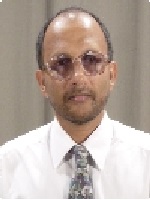
Nalin Wikramanayake is a Senior Lecturer in the Department of Civil Engineering at the Open University of Sri Lanka. His main areas of teaching and research and coastal hydrodynamics and sediment transport, coastal zone management, extreme events, water pollution and sustainable sanitation. Nalin has also been involved in several inter-disciplinary intiatives including the Land-Ocean Interactions in the Coastal Zone (LOICZ) project and the establishment of the Master of Development Practice at the University of Peradeniya.
Q: What is a career achievement of which you are most proud?
A: I am most satisfied with things that have happened incrementally, with many partners and stakeholders, that lead to practical applications. In relation to coasts I have been part of many studies related to understanding our wave climate and linking it to global data sets. A comprehensive assessment of wave energy was completed in 2020 and we hope to use these results in areas such as safety for swimmers and small boats.
Another long-term interest has been the study of seasonally open coastal inlets and their associated lagoons and wetlands. We have over a hundred of these systems in Sri Lanka each with a different combination of issues. We have been able to collect data and carry out pilot interventions that have led to better management of these systems.
Q: What do you enjoy about being a scientist?
A: I enjoy the progress from observation to matching with theory and experience – even if it is only to confirm that things in Sri Lanka work the same as elsewhere! I am also happy when share the results with students, practitioners and the general public.
Q: What do you think are some of the most exciting scientific advances in your field?
A: If you take coastal hydrodynamics and sediment transport, there have not been any significant theoretical advances. What is exciting to me–and this is true of almost every field–is the combination of increased data availability, new tools and resources for data analysis that have become available in the last decade or two. Google Earth Engine is an example that was highlighted at a recent FEC session.
Q: What are some characteristics of a successful scientist?
A: Deep curiosity about the way the world works and a passion for continuous learning.
Q: If you weren’t a scientist, what other job would you have?
A: I would be a teacher – but it is better to be both – as I am!
Q: What do you do outside your work?
A: My interests include bird watching, hiking and snorkeling.
Q: What was your most valuable experience in LOICZ?
A: Interacting with scientists from a broad range of disciplines and learning about the strengths and limitations of each field. Attempting to develop and maintain regional networks with a common focus.
Q: What do you think were some of the most exciting scientific advances of LOICZ?
A: The Coast has the most concentrated and diverse interaction between different natural systems and between human and natural systems. LOICZ has contributed to the understanding and quantification of these interactions and developed processes and tools towards sustainability.
However, I think that the regional reach of LOICZ was also a significant achievement. The regional activities brought together scientists from many disciplines and developed a sense of contributing to an integrated scientific effort with implications at the local, regional and global scales.
Q: As LOICZ transitioned to Future Earth Coasts, what frameworks and concepts have been inherited? And what new changes have been brought about?
A: As I understand it Future Earth Coasts follows what one may term the “LOICZ philosophy” – consider interactions over a range of space and time scales, integration of natural and human systems at all scales and the objective of sustainable coastal development over all these scales. Scenario building and the selection of sustainable pathways from many options is something new – and signals the move towards “action science”.
Q: What do you think are the biggest challenges/opportunities faced by Future Earth Coasts today?
A: Being global in outlook but still reaching local applications. This is once again due to the special features of the Coast when compared to other zones. While local applications were also the goal of LOICZ, FEC has an explicit focus on sustainable pathways.
Q: Do you have advice for young scientists?
A: Scientists in less-developed countries have many challenges – funding, finding suitable staff, turnover of personnel, inadequate government and regulatory support, etc. I would encourage them to keep trying, think long term but go for incremental progress, work with others and network – in-country, regionally and globally.
Q: What kind of support and resources are you willing to offer to help FEC fellows?
A: I am happy to discuss their work either during common presentation sessions or one-on-one. I suggest that FEC create a “Coastal Futures” forum online that could be used by researchers and practitioners to exchange ideas and experiences.
Pitch note – FEC Dialogue with Academy Members: https://www.futureearthcoasts.org/fec-dialogue-with-academy-members/
